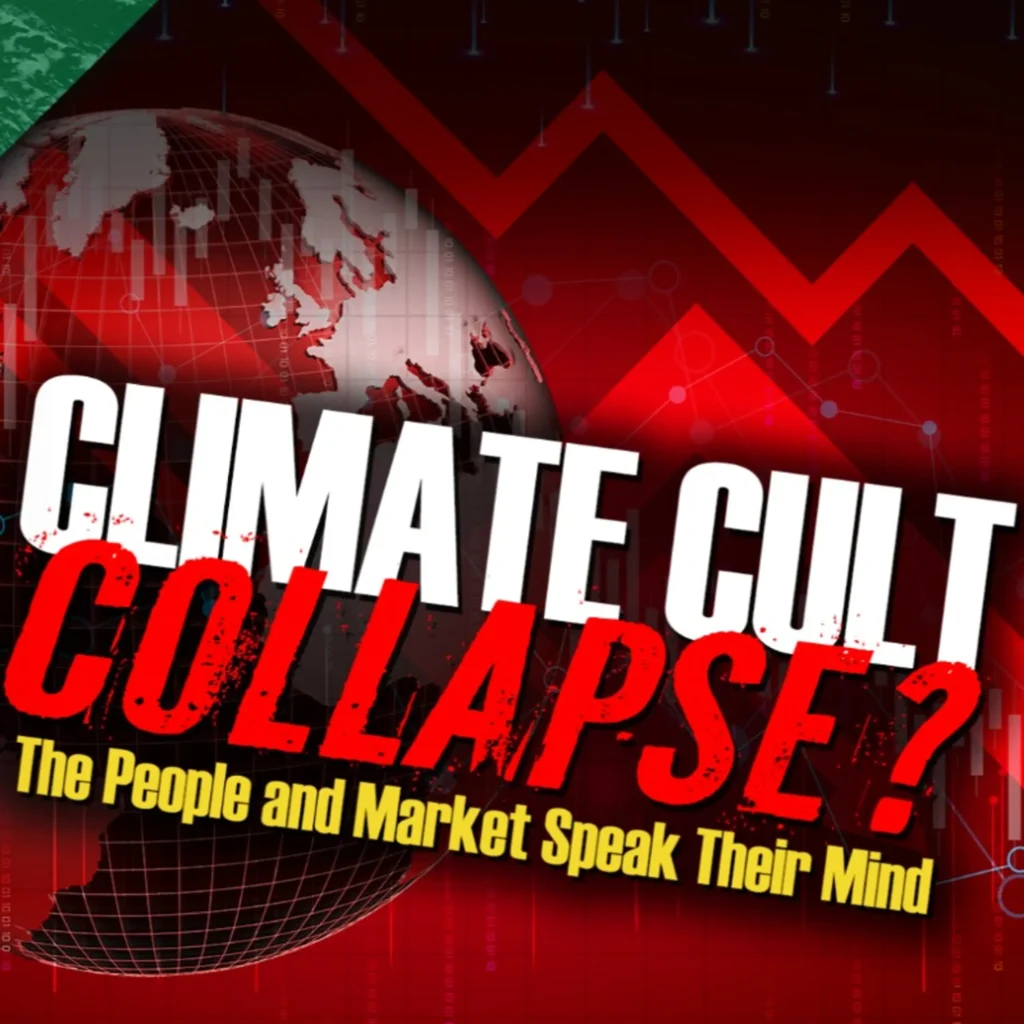As respect for journalists and their trustworthiness declines, mainstream media outlets, both print and television, are losing readers, subscribers, and viewers. By any measure, journalists aren’t trusted. In public opinion polls, the only professions consistently falling below journalists on their trustworthiness or ethical standards are politicians and used-car salespeople.
This doesn’t surprise me. For more than 20 years I’ve watched supposedly respected media outlets, with investigative journalists on staff, fail to accurately portray the debate surrounding claims human fossil fuel use is causing catastrophic climate change.
Journalism, until recently revered as the “fourth estate,” is supposed to promote objectivity and facts, with its practitioners serving as watchdogs against government corruption and malfeasance and big moneyed interests who collude with bureaucrats and politicians against the average Joe. Yet on the issue of climate change, the mainstream media long ago abandoned objectivity and their role as watchdog in favor being cheerleaders and promoters of conspiracy theories and ever more powerful, intrusive government.
Mainstream media outlets uncritically parrot and hype the most alarming claims and extreme scenarios, however unlikely, made in every report governments issue saying human-caused “climate extremes” are an “existential threat to humanity.” They report the claims as if they were revealed truths, given to them from on high. Foregoing journalism’s fundamental responsibility—similar to the responsibility scientists have—to question everything, to start from a position of skepticism and investigate the source of the claims, the assumptions built into them, whether they are supported by actual data, and whether other data contradicts them, the media instead proclaims, “Science has spoken. Humans are destroying the earth.”
There is no consensus that catastrophic climate change is happening and humans are causing it. Yet, due to lazy or biased reporters and editors not seeking out contrasting views or voices, and publishers and broadcasters not requiring their operations to maintain standards of fairness and veracity, the mainstream media uncritically presents a climate crisis as settled fact, as certain as that the world is round.
Thousands and indeed tens of thousands of scientists around the world refute all or part the claim there is an anthropogenic climate crisis, yet their voices are seldom heard, because the media is too busy promoting its favored lie to investigate alternative claims. Copious research, including hundreds of peer-reviewed studies and reports, is published each year casting doubts on various assumptions and projections made by the leaders of the UN’s Intergovernmental Panel on Climate Change and their fellow travelers deeply embedded in the bowels of government agencies such as NASA and the National Oceanic and Atmospheric Administration.
To be fair, no paper or any single reporter can cover climate every day, much less read and understand every study that gets published. Yet it is incumbent upon any honest news organization to seek out opposing points of view or countervailing evidence when the issue under discussion is claimed to be so critically important that major changes to public policy and wrenching changes to the economy, government institutions, and individual rights are being proposed to solve a particular problem, in this case the so-called climate crisis. This is where almost all mainstream media outlets fail in their duty. Some have openly foreclosed all debate, publicly announcing as an editorial policy they will no longer seek the views or publish articles from any scholar, no matter how qualified to speak about climate issues, who does not accept as fact humans are causing dangerous climate change.
Other outlets, while less open about their editorial bias, still downplay ongoing, lively debates about the causes, consequences, and possible responses to global warming, by portraying any climate skeptics whose existence they do deign to acknowledge as shills for industry or eccentrics, far outside of mainstream scientific opinion.
If journalists displayed just a modicum of intellectual curiosity, they could easily find peer-reviewed surveys of the literature, hundreds of skeptical studies gathered in a few sites, and letters signed by hundreds of scientists attesting to the falsity of one or more aspects of this three-part claim: the climate is changing and humans are the cause, on the whole the results will be unreservedly bad or catastrophic, and we must end the use of fossil fuels in the near future to prevent the destruction of human civilization and the environment.
The most prominent surveys of the literature are a series of peer-reviewed volumes produced by the Nongovernmental International Panel on Climate Change (NIPCC). Over the past decade, NIPCC has produced six technical reports discussing why the physical science does not support the claim humans are causing dangerous climate change, evidence that more carbon dioxide and a modestly warmer world might actually benefit human society and the environment, and evidence the development and use of fossil fuels, rather than being the bane of humankind’s existence, has instead been a boon for people and the planet.
If a journalist were to visit CO2Science.org, the website of the Center for the Study of Carbon Dioxide and Global Change, or NoTrickZone.com, for example, he or she would find summaries of literally thousands of peer-reviewed papers that undermine one or multiple fundamental tenets, assumptions, sources of data, or projections behind the theory that humans are causing catastrophic climate change. For instance, CO2 Science summarizes thousands of studies and experiments demonstrating increased carbon dioxide and modest warming tends to benefit plants, including staple crops critical to reducing hunger and malnutrition where it still exists around the world. And each year, the No Tricks Zone gathers on a single website hundreds of studies showing nature (including solar activity and large-scale oceanic patterns) is playing a bigger role in climate than human carbon dioxide emissions, and that assertions climate change is causing more or more-severe weather extremes are just not true.
Over the past decade, thousands of scientists have signed letters attesting to the fact claims made that humans are causing climate change are overstated at best and flatly mistaken at worst. Most recently, nearly 90 prominent Italian scientists wrote an open letter to their government, which states, in part,
Carbon dioxide is itself not a pollutant. On the contrary, it is indispensable for life on our planet.
… [T]he anthropogenic origin of global warming is an unproven hypothesis…. On the contrary, the scientific literature has increasingly highlighted the existence of a natural climatic variability that the models are not able to reproduce. This natural variability explains a substantial part of global warming observed since 1850. The anthropogenic responsibility for climate change observed in the last century is therefore unjustifiably exaggerated and catastrophic predictions are not realistic.
This follows an open letter from members of the American Physical Society to its ruling council, objecting to its national policy statement on climate change, which the signatories argued wrongly concluded human greenhouse gas emission were changing the climate. And an open letter, signed by nearly 150 international scientists, to then-UN Secretary General Ban Ki Moon, stated,
Climate change science is in a period of “negative discovery”—the more we learn about this exceptionally complex and rapidly evolving field the more we realize how little we know. Truly, the science is NOT settled.
Therefore, there is no sound reason to impose expensive and restrictive public policy decisions on the peoples of the Earth without first providing convincing evidence that human activities are causing dangerous climate change beyond that resulting from natural causes.
The godfather of all letters objecting to climate change alarmism, the Oregon Petition Project, circulated by the Oregon Institute for Science and Medicine and signed by more than 31,000 American scientists, including more than 9,000 with doctorates, states,
There is no convincing scientific evidence that human release of carbon dioxide, methane, or other greenhouse gases is causing or will, in the foreseeable future, cause catastrophic heating of the earth’s atmosphere and disruption of the earth’s climate. Moreover, there is substantial scientific evidence that increases in atmospheric carbon dioxide produce many beneficial effects upon the natural plant and animal environments of the earth.
It doesn’t take much effort to discover the truth about climate change. It is this: there exists a lively debate concerning the causes and consequences of ongoing climate change, and there is an even more active discussion and disagreement concerning whether policies like taxes on carbon dioxide, restrictions on fossil-fuel use, or geoengineering options proposed to mitigate or prevent further climate change would be effective or whether they would, in fact, cause more harm than good.
There are two sides to the climate debate, and broadcast, online, and print media should acknowledge this, highlight the debate, and let the informed public decide whether they believe humans are dooming the world through fossil fuel use, and what if anything to do about it, without being harangued, cajoled, or prodded by journalists and talking heads with a socialist agenda.
- H. Sterling Burnett
SOURCES: NIPCC; NIPCC; NIPCC; No Tricks Zone; CO2Science; No Tricks Zone; Oregon Institute of Science and Medicine; The Heartland Institute; The Heartland Institute
IN THIS ISSUE …
Coal use grows globally … Americans reject climate battle costs, poll shows
Paris climate agreement commitments be damned, it’s full speed ahead on coal use globally.
According to British Petroleum’s (BP) statistical review of world energy, worldwide coal production increased 4.3 per cent in 2018 and consumption rose 1.4 per cent, the fastest increase for either since 2013. Most of the growth in use was in the Asia-Pacific region. Coal production in the United States grew by 6.9 percent in 2018, in part to supply foreign demand, with global coal exports growing by 6.5 percent, also the highest levels since 2013.
Last year brought the second straight year of growth in coal production and consumption, after three years of declining production.
Global carbon dioxide emissions grew by 2 percent in 2018, and BP’s analysis makes it clear without the continued growth in the production and use of shale gas, primarily in the United States, and the growth in exports of liquefied natural gas from the United States and Australia, carbon dioxide emissions would have increased even more.
SOURCE: Global Warming Policy Forum; British Petroleum
AMERICANS REJECT CLIMATE BATTLE COSTS, POLL SHOWS
A recent poll conducted by Reuters/Ipsos confirms what previous polls have shown: although many Americans say they are concerned about climate change and believe the government should take steps to combat it, they aren’t willing to pay much to fight it. Concern for climate change is a mile wide and an inch deep.
Conducted between June 11 and June 14, Reuters/Ipsos’ poll included responses from more than 3,000 interviewees. “Nearly 70 percent of Americans, including a majority of Republicans, want the United States to take ‘aggressive’ action to combat climate change—but only a third would support an extra tax of $100 a year to help,” the report states.
Slightly more than half of those polled said the United States should try and wean itself off of fossil fuels within 10 years, and 78 percent believe the government should invest more money developing less-emitting energy sources such as geothermal, solar, and wind. But when it comes to paying for all this or making personal sacrifices, the commitment to fighting climate change flags.
Only 34 percent of those surveyed said they would be “very likely” or “somewhat likely” to be willing to pay an extra $100 a year in taxes to help to fight climate change. Only 29 percent of poll participants would be willing to pay $100 more for electricity each year—less than nine dollars per month—to reduce greenhouse gas emissions. Just 38 percent of those surveyed said they would help cut emissions by carpooling or using public transport, and only 33 percent said they’d be willing to trade their car in for an electric vehicle to cut emissions.
The Climate Change Weekly Newsletter has been moved to HeartlandDailyNews.com. Please check there for future updates!





